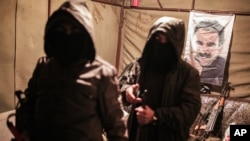Serbia is demanding “clarification” from Turkey after pro-government media outlets reported that a “rented” Serbian sniper fighting for the Kurdish PKK rebels had been killed by Turkish security teams.
The Serbian news agency Tanjug and other media said the Serbian ambassador to Turkey had gone to the Turkish Foreign Ministry and that the Turkish ambassador to Serbia had been summoned to the Serbian Foreign Ministry.
Serbian media could not confirm the Turkish reports of the sniper. The Turkish government has offered no confirmation of the alleged incident.
Most of the reports in the Turkish media about rented Serbian snipers were attributed to “intelligence units,” without any names or affiliations. Most mainstream Turkish media did not report the story.
The staunchly pro-government daily Yeni Safak reported that a Serbian sniper hired by the PKK had been captured in the border town of Cizre in southeastern Turkey. Another pro-government daily, Vatan, reported that one Serbian sniper had been killed by Turkish forces and another had been caught in that PKK stronghold.
Turkish Prime Minister Ahmet Davutoglu said only that foreign snipers who were fighting for the PKK in Turkey’s Kurdish cities had been killed. Turkish Interior Minister Efkan Ala later called the stories of “Serbian snipers” speculation and baseless.
“We do not disclose information about their nationalities,” he said.
Longtime tension
The reports are stirring old tensions. The Balkans were under Turkish control for about 500 years during the Ottoman Empire, and brutal wars ensued after independence. That history has long undermined relations between Turkey and Serbia.
Serbia took offense in 2013 when then-Turkish Prime Minister Recep Tayyip Erdogan expressed solidarity with the former Serbian province of Kosovo, which gained its independence in 2008.
Three years earlier, a pro-Turkish government newspaper said the PKK was using Serbian snipers to try to kill Turkish generals. The newspaper also claimed Serbian snipers killed 250 Bosnians during the Balkan wars.
But in recent years, Belgrade and Ankara have tried to keep good relations. Serbian authorities said that if reports of a Serbian sniper in the PKK were true, they wanted to help Turkey curb the practice.
“The embassy expects to be officially informed about the case by the Turkish side, so the relevant Turkish and Serbian institutions can work together on its clarification in the aim of the fight against terrorism," the Serbian Embassy said in a statement.
But Ali Akel, a journalist-commentator from Turkey, told VOA the Turkish reports were less about Serbia and more about discrediting the PKK and demonstrating its violent ways.
The sniper reports came as Turkey is facing blistering international criticism of its violent crackdown against Kurdish rebels and predominately Kurdish towns in southeastern Turkey.
“Sometimes the foreign fighters are Armenians, sometimes as in this case they happen to be Serbians or uncircumcised non-Muslims,” Akel said. “It is done for spreading fabricated information. It is a sort of psychological war.”




